
Traditional Review
Fire Emblem Engage is a celebration of the entire history of the series. If you’ve got a favorite game in the series, there’s a very good chance you will find something here that you’ll get at least a small chuckle out of. That said, the game has a standalone story, so you won’t need to have played a previous entry in the series to enjoy this one. The callbacks are woven into the story, but also don’t feel completely shoehorned in either.
At the time of writing, this game has been out for (almost) a year now, so I won’t spend a ton of time talking about the game from the perspective of a traditional review – a quick Google search will reveal plenty of reviews that have done a better job than what I’d be able to provide for you here. But for the uninitiated, Fire Emblem Engage is a Strategy RPG. The game is played in Chapters (or standalone levels). In each Chapter, you command anywhere from 5 to 14 characters in turn-based battles on a grid-based map against an enemy army that usually outnumbers you. But like an RPG, the characters you command all gain experience, level up, and grow stronger as the game progresses. Very standard fare for Fire Emblem games nowadays.
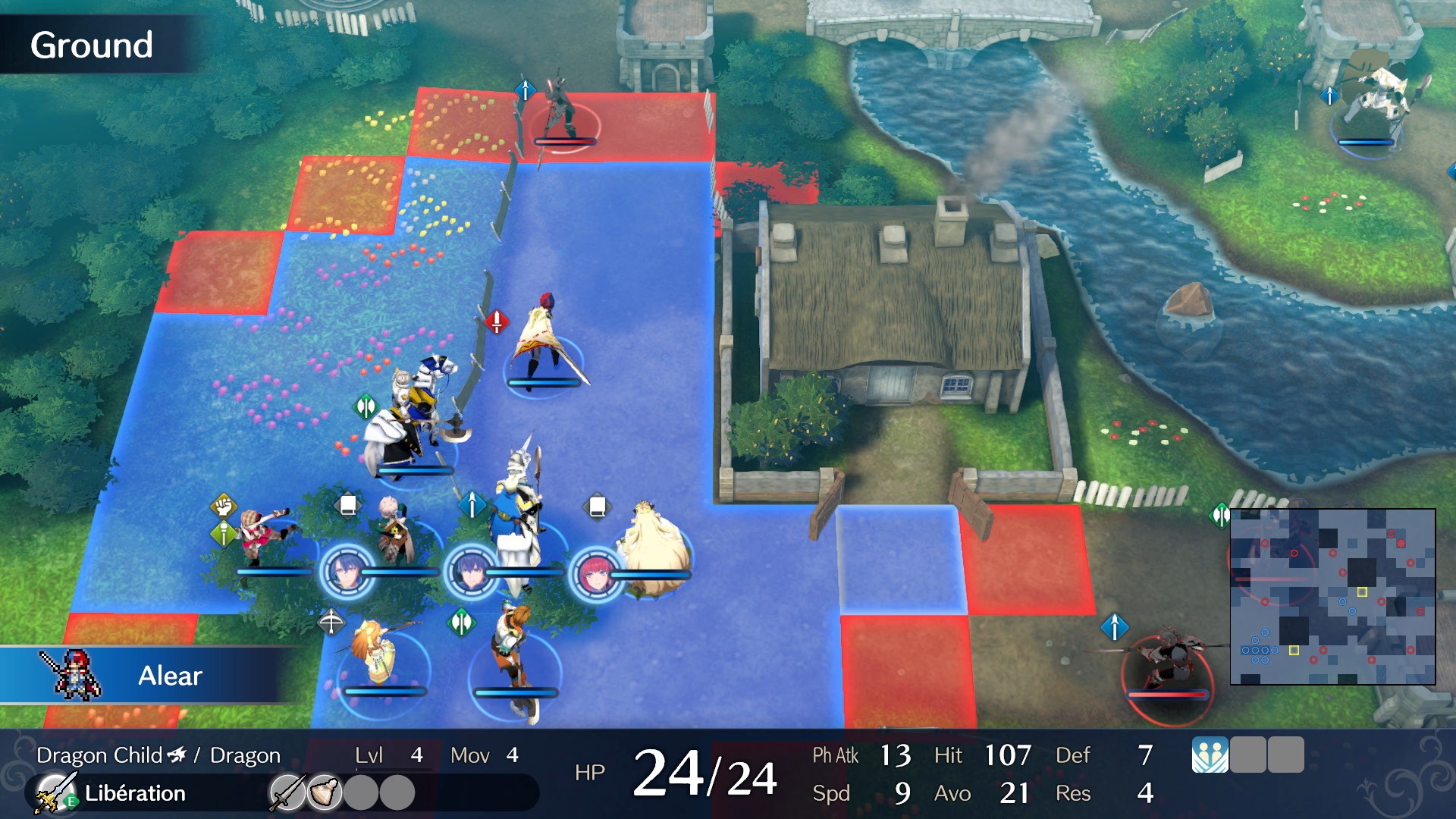
In the beginning of the franchise, and for a number of entries beyond the first one, Fire Emblem was primarily focused on the elements mentioned in the previous paragraph. I myself have been enjoying titles in the series since 2001, when Fire Emblem was released in the U.S. for the Game Boy Advance. But over the years, Fire Emblem has found a wider audience and commercial success by focusing on the personalities of the characters, and their relationships with each other – activities that take place between the actual battles. From the outside looking in, less-informed individuals might assume that the more recent games in the series are more comparable to dating sims rather than strategy games. While the strategy RPG core of the series has never left, it’s safe to say that some of the strategy aspects of the series had been simplified in prior games – namely Fire Emblem Three Houses – in service of the relationship-building parts of the game. I’m happy to report that Fire Emblem Engage returns its focus to the battlefield, while still having plenty of compelling character interactions to engage with.
To briefly summarize my time with this game on its own, I had quite the polarizing experience. For every high, there was also a low of equal value. My time on the battlefield felt like a much-needed return to form for the series, but I wish the currency and support-earning activities between battles on the Somniel (the name of your army’s home base) could have either been better, or skipped entirely. A lot of the narrative beats in this game’s story felt quite refreshing compared to what I expected, and I was pleasantly surprised to encounter them amidst a Fire Emblem story that largely doesn’t stray too far from the “good guys/good dragon(s) vs the bad dragon” formula the series is known for. In addition, there are moments in support conversations (the vehicle for relationship building, which I’ll talk more about later) that demonstrated more virtue than I was expecting to find. But all of these moments were completely undercut by the game’s voice direction. The main character is a total wuss, and almost all of the voice-overs in the game are completely over the top, which turned out to be pretty grating after listening for a longer than normal playthrough. I would be all right if I never had to hear Hortensia’s voice again. You’ll know it when you hear it. Looking back as a whole though, I had an absolute blast with the game, and my score reflects it.
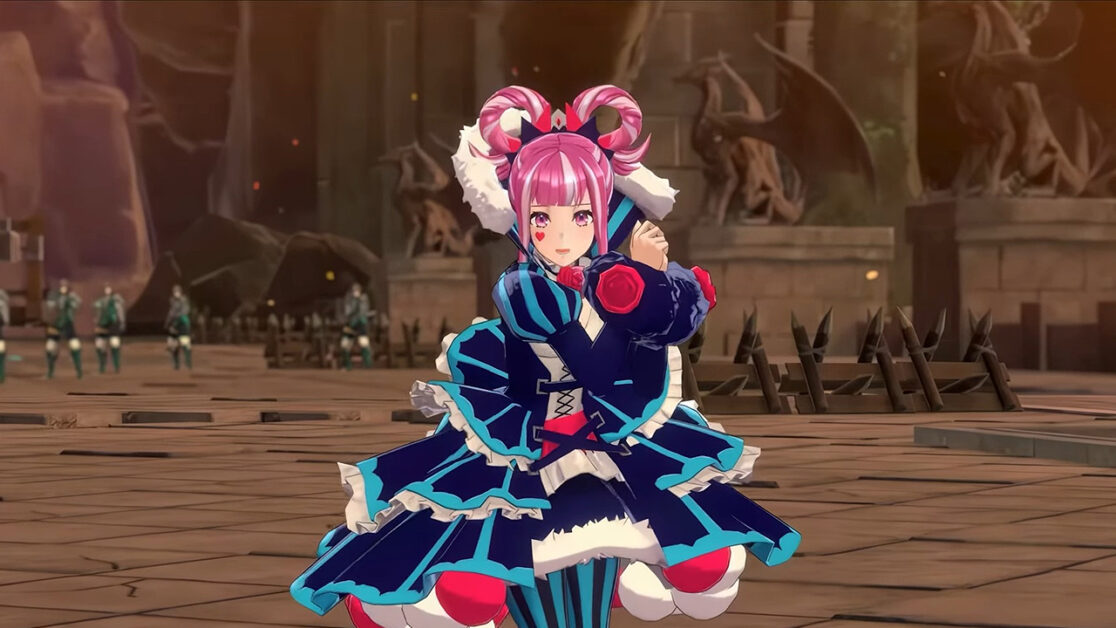
Scoring: 90%
Art – 5/5 – Very colorful, anime style. Probably not what you’d expect for people going to war, but it fits the tone of the game.
Music – 4/5 – Another polarizing experience. Some tracks are amazing, with rearrangements of old titles coming to mind. But some are not easy on the ears, with the boss theme (which you hear frequently) being the worst offender. The good ones are worth seeking out and pausing to appreciate.
Story & Writing – 4/5 – Character development is decent, and implementation of old characters is done without making it feel forced. Voice Delivery could have been much better (or maybe even removed entirely). Story is mostly standard fare for Fire Emblem, but there are enough twists and themes on display here to make it interesting.
Gameplay – 5/5 – This is a back to basics approach for the Fire Emblem series, with a return to focus on the battles. If you fell in love with the series on the Game Boy Advance, you’ll probably like this one.
Design – 4.5/5 – There’s a lot of skill customization you can give your characters in this game, which gives a lot of variety. But there are big impactful story moments in the game that are not telegraphed, that can impact your long-term strategy negatively if you don’t see it coming and are unable to prepare accordingly.
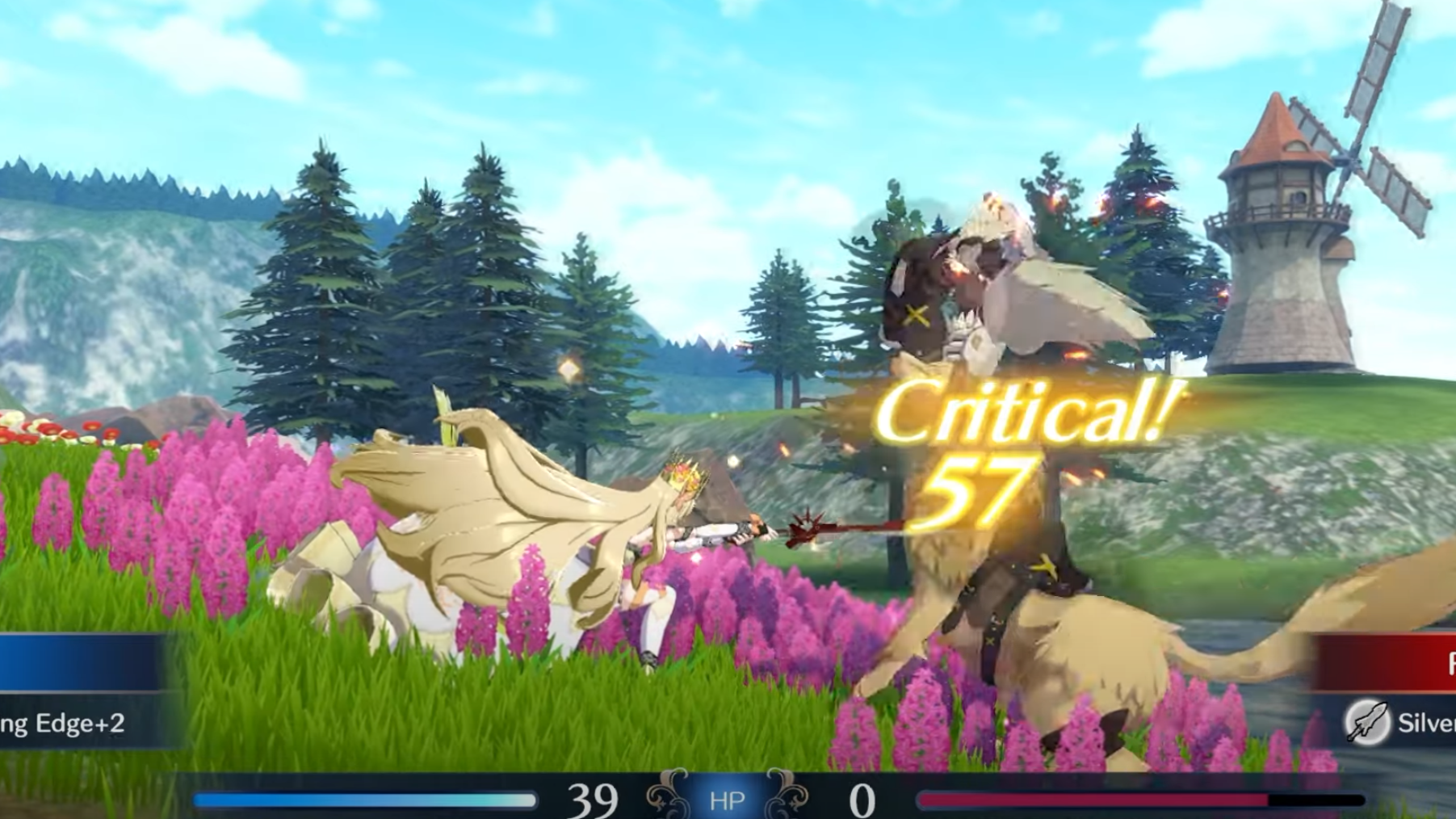
Pleasantly surprised by my enjoyment of the game, considering my apprehension before launch.
Spiritual Edification – Can We Learn Anything from This Game?
Where to begin? This game has a lot to discover and unpack, and explores plenty of themes that are worth highlighting. The most obvious one (and the one that is common throughout the series) is the theme of friendship.
Naturally, as a group of warriors on a harrowing mission to defeat evil, you’ll probably want to know that your comrades will have your back in a pinch. Fire Emblem highlights this to great effect using its support conversation system. In battle, as you complete most actions (battling an enemy or healing an ally for example) with one character standing next to one or more compatible characters, a hidden support meter will go up. You can also give gifts and perform activities in the Somniel to increase this invisible meter. Once this meter reaches a certain level, a “support conversation” will be made available, that you can also then activate between battles. The topics of these conversations can vary greatly, including things as inconsequential as what tea a character prefers, as goofy as one character teaching a klutzy character how to cook, and as serious as one character accusing another of secretly undermining the entire allied army. There is also a gameplay motivation for triggering these support conversations. After they take place, the two characters involved will now receive a buff in battle when they are positioned next to one another. The more conversations the two characters have, the stronger that buff will be.
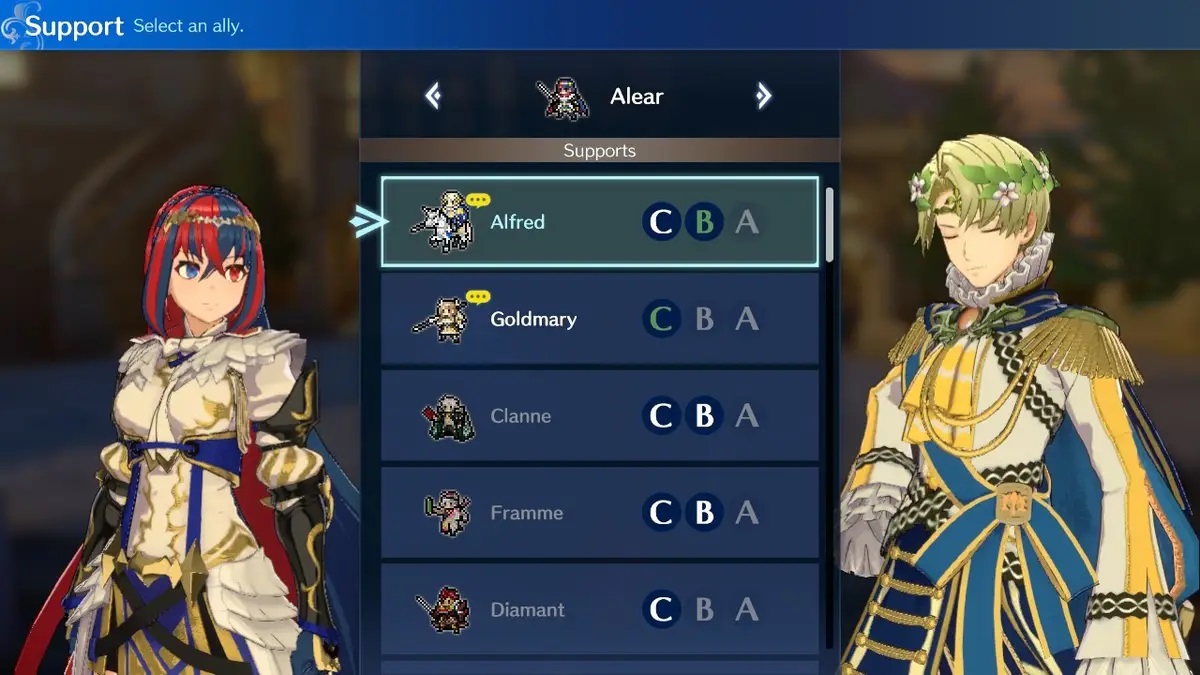
to interact with each other – which I would recommend.
There are quite a few characters in this game who have pasts that are… unsavory, to say the least. One character in particular, Yunaka, caught my interest. From the moment you meet her, there are heavy clues in her dialogue that indicate she’s hiding something from the rest of the team. The only way to learn more about what she might be hiding is to develop her relationships through support conversations. When you begin to build out those relationships, there are a couple of characters who are instantly suspicious of her (which is fair, all things considered), but learn more and come around, and others who basically teach her how to cope with some of the trauma that she’s been through. But there are some key characters who basically tell her that they trust her despite whatever she may have done in the past, and do so by affirming the good that she’s done since they’ve known her. While some of the conversations that fall in this last group may seem a bit naive at times, I think it’s these characters that most accurately demonstrate the behavior we should try to emulate.
There are other members of your army that have dark backstories – namely a few of the royals’ retainers, hand-picked by princes and princesses to be given a second chance – but I found Yunaka’s arc to be the strongest example of this theme. I’ll remain vague to avoid major spoilers, but there’s also a huge plot twist that throws even the main character in this boat (or, perhaps even makes him the captain of said boat). All of it results in a narrative that states you are not defined by the mistakes you’ve made in the past, nor the family that raised you. No matter where these warriors came from, here they all are, doing their part to help the “universal good” defeat the “universal evil.” You still have the ability and the opportunity to make the world a better place for someone around you.
Finally, another big theme that hit me by surprise (in part because it didn’t really show up until the last stretch of the game), was the idea that indifference and apathy – not hate – is the root of a lot of evil in this world. It’s hard to touch on this one without spoiling a bit of the ending, but it left a big enough impact on me that I’ve got to touch on it. So this is your spoiler warning for a small bit of the end of the game. I’ll contain it to only the next paragraph.
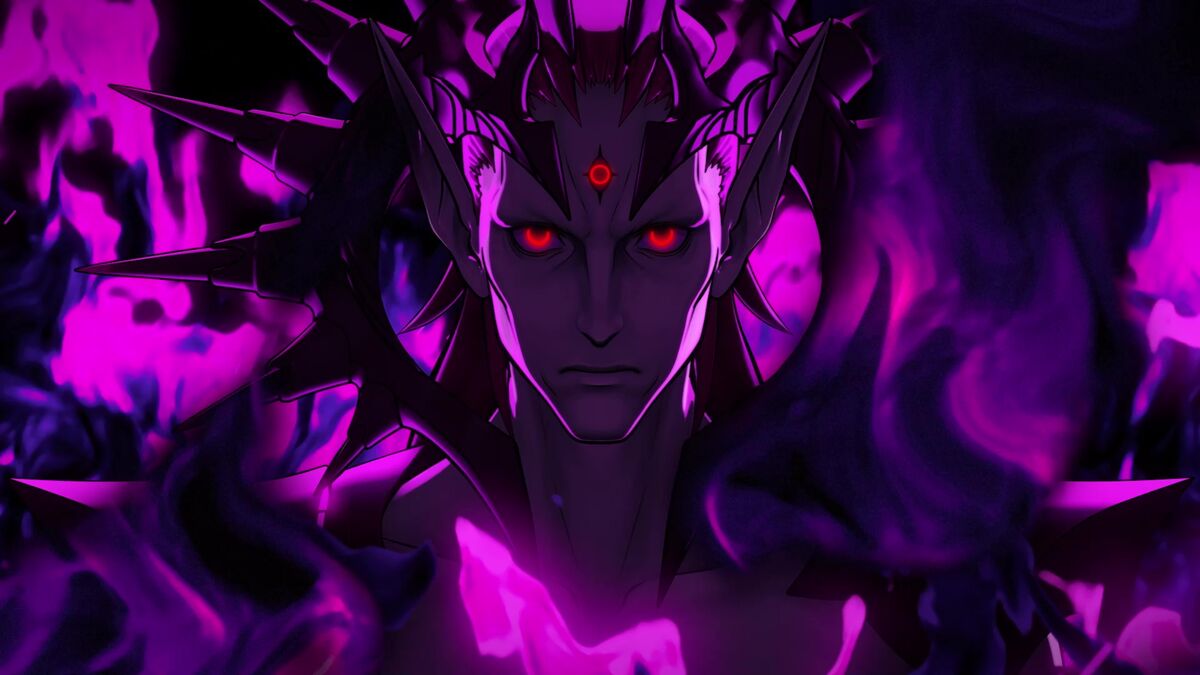
The game ends providing a pretty clear picture that the opposite of love is not hate, but indifference. I think it’s easy enough to see in real life the negative aspects of hate and ambivalence in real life, but in my personal experience, indifference is a bit harder to avoid. The pain of losing love is so great, that it’s not always easy to see that having love and losing it is better than not having loved at all. A lack of love and care inevitably results in a lack of motivation, which in turn results in personal stagnation, both in the spiritual sense and in the worldly sense. You’re not likely to make a difference if you don’t care. Kudos to Fire Emblem Engage for pointing this out!
Challenges to Catholicism
In terms of what to be careful with, there are a few big things in this game that should be mentioned outside of what you might find in the ESRB rating on the back of the box. But to cover the bases, you will find violence (pretty mild considering you’re fighting a war – no blood here), mild language, and scantily clad women (but no explicit jokes or sexual references) in this game.
The main character in this game holds the title of “The Divine Dragon.” Most of the world in this game practices a religion that worships this Divine Dragon. The ones that don’t typically worship the “Fell Dragon” instead, and are likened to satanists. On the surface, this might not seem all that problematic, considering it’s all pertaining to a fictional world. But listening to “priests” in your army who serve the divine dragon talk about how it’s okay to be loose in your practice certainly left me with a funny feeling. Also, there are characters in the game who convert from the religion of the Fell Dragon to the religion of the Divine Dragon after realizing how crummy he was. But when these characters encounter other members of the old faith, they seem to approach it with the attitude of “well if it’s working for you, just carry on.” That last bit isn’t explicitly stated, but there does seem to be a sort of nonchalance about religion in general. And on top of it all, while the Divine Dragon’s true identity reinforces the theme of redemption, it absolutely flies in the face of Catholic teaching, when you consider that worship should be reserved for the one God who created all. I don’t think anyone’s going to walk away from this game worshiping either of these entities. In the best case scenario, a player might view religion in the game in the same way one might view a modern take on Greek Mythology, but in the worst case scenario, a player may walk away from the game with an incorrect view of the importance of tradition in the Catholic faith.
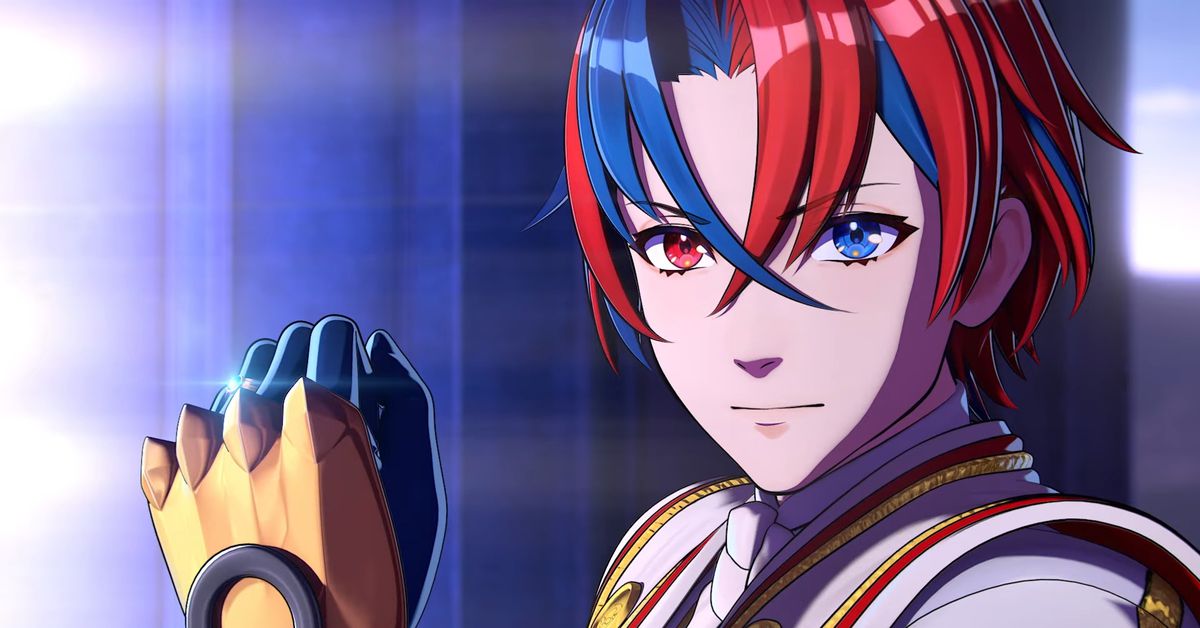
Another shortcoming of the game is its commitment to its own virtues. Upon completing Emblem Sigurd’s paralogue chapter, he shares some of the details of the events that played out in his game (again, big celebration of Fire Emblem history here). He challenges the divine dragon by asking him if he would seek revenge on the one(s) who did harm to his loved ones. As the conversation builds, the divine dragon states that he wouldn’t seek revenge (Yes!), and Sigurd approves of his decision (Double Yes!)… because “the truth is subjective.”(Nooooo!) Of course, this was probably just a poor choice of words. Does the development team really mean to say the truth is subjective, or are they just trying to say the picture is bigger than we think it is? While this was the one that stood out to me the most, there are other examples of the game watering down its own virtues for either the sake of calling back to the series’s history, or trying not to take a stance in the game that might cause polarization in its player base.
On the other hand, this failure to fully commit to a stance on a given issue actually has an interesting effect in other conversations within the game. Rosado is a mid-to-late-game recruit to your army who, despite his feminine dress and appearance, is identified as a man. The game leaves no question about the fact that Rosado is biologically male, and this is affirmed by every character in the game, including Rosado. Rosado does not have a desire to be a woman, nor does he believe that he already is one. He simply likes “cute” things, to the point that he wishes to emulate them, even if this behavior falls outside of what most people would consider normal. So while on the surface, Rosado appears to be a representative of the transgender community, he instead serves as a tool the game uses to portray the much more morally ambiguous theme of “Stay true to yourself, even if it makes you weird.” In reviewing all of his support conversations, there is little to no content that challenges either side of the gender identity debate. The closest he comes to approaching this is mentioning that his parents and the village he grew up in did not hold him to the norms that are typically dictated by a person’s gender. This statement is not elaborated on, but it’s implied that it is in reference to his love of “cute” things, along with his dress and appearance, rather than an attraction to the same sex, or holding the belief that he wasn’t born with the proper reproductive organs. In addition to all of this, none of the other characters in the game ostracized him for behaving differently either. Every interaction he has with another member of the army is all done to affirm his positive attributes and contributions to the greater goal. In this sense, I didn’t find anything sinful about the depiction of this cross-dressing character. (It should be noted my experience was with the English version of the game. I can not say if the original Japanese portrayal of the character was changed during the localization of the game for its western audience.)
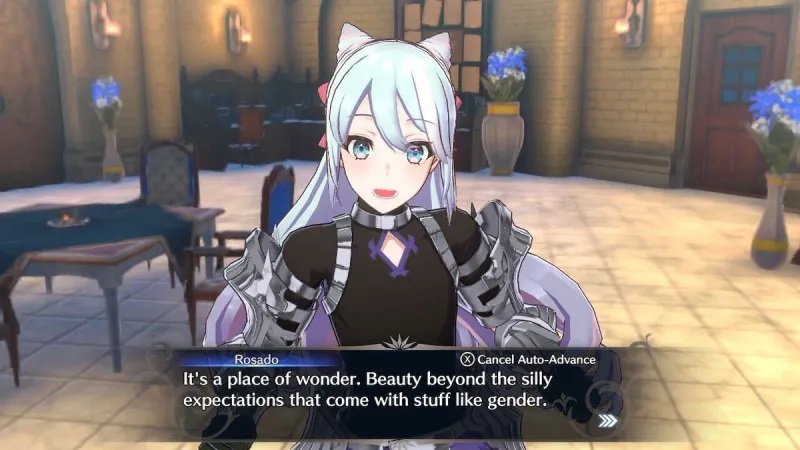
Could be interpreted many ways, if taken or remembered out of context.
Finally, considering the recent history of the Fire Emblem series, and considering the title and the focus on rings in this game, you might be wondering how marriage is portrayed in this game. In other recent titles in the series, you take ownership of the main protagonist’s choices, and you are typically able to reach an “S” rank support conversation with a selection of other characters. This S rank support level would result in an explicitly stated intent from both individuals to marry one another. In Fire Emblem Engage, you are still able to achieve the S rank support conversation, and can do so with any member of your army, male or female. In order to achieve this level, the protagonist even gives what is fittingly called a “Pact Ring” to the individual he or she chooses. While none of the S rank conversations uses language that explicitly states any sort of sexual commitments, there are plenty of life-long implications associated with conversations that are had. Thus, the player can choose to initiate mild but suggestive conversations that take place between two members of the same sex. However, these conversations only come about by the player’s choice; there are no canon same-sex romantic pairings in the game outside of what the player may choose for the protagonist. On another note, they had the foresight to make most of the S Rank conversations with minors far platonic than most of the others. Probably a wise choice on the part of the developer.
In summary, Fire Emblem Engage is a solid entry in the series from a gameplay perspective. The social and relationship aspects are all here, but the primary focus is on the battles, which is a good thing. While the story as a whole isn’t really anything too surprising for the series, there are some interesting beats that inject a bit of life into the tried and true “good dragon versus bad dragon” formula. The efforts made in making all the characters relatable – no matter which side they fight for – result in some vignettes that do actually highlight some virtues we can and should put into practice (forgiveness, the dangers of apathy), so it’s a shame that the voice direction left me devoid of any desire to spend an extended amount of time with any of the characters. But that said, I think the virtues on display here have a much greater presence than the game’s shortcomings seen when viewing the game through a Catholic lens. If you’re looking for an excellent strategy game, or curious about the Fire Emblem series, Fire Emblem Engage is worth your time. From a moral perspective, I think most people will walk away remembering the things it gets right before the misguidance present here. We could all do with a greater willingness to forgive, and a reminder that we should be mindfully engaged in all our relationships, rather than detached from them.
